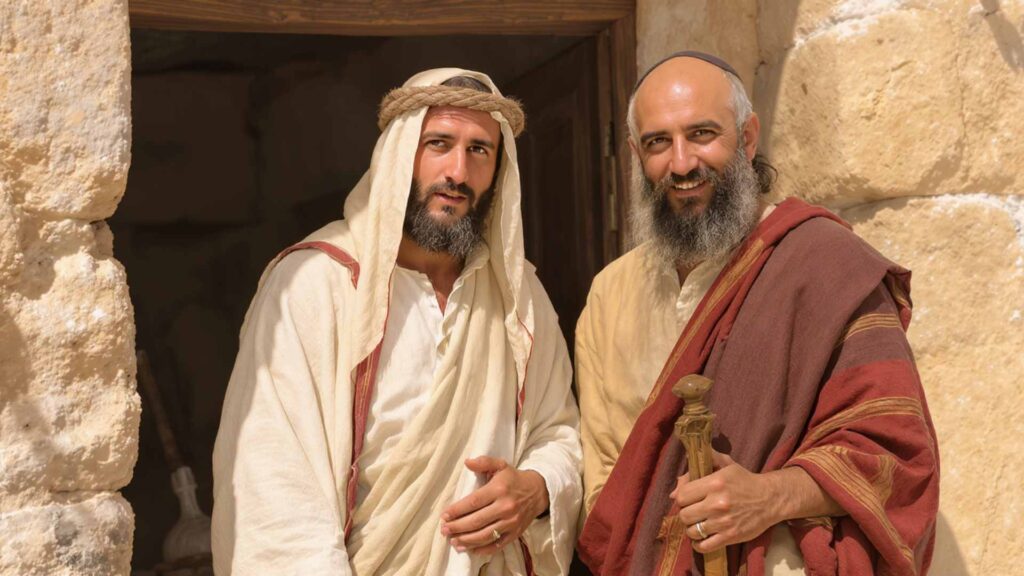James, a servant of God and of the Lord Jesus Christ,
To the twelve tribes scattered among the nations: Greetings.
James 1:1

"A servant of God and of the Lord Jesus Christ"
This one phrase is easy to read quickly and move past, but when I slow down and really sit with it, God speaks to my heart in such a personal way. James could have said so many things about himself. He could have introduced himself as the brother of Jesus. That would have made people listen possibly, he knew Jesus that was his connection. But he doesn’t lean on any of that. He simply calls himself a servant.
That word servant in the original Greek her is the word doulos, it means bondservant. Someone who has willingly chosen to belong to a master. Someone who has given up their personal rights to serve out of love and loyalty. James is saying, “My life isn’t my own, I belong to God.”
Reflection
There are so many times I want control. I want to make my own plans, chase my own goals, live life on my terms. Even in my relationship with God, I sometimes catch myself slipping into the mindset of doing things for Him, but still clinging to control behind the scenes. But this verse invites me to something deeper than doing. It calls me into being being a servant. Being someone who wakes up each day and says, “Jesus, I’m Yours. My plans, my time, my voice, my life I surrender it to You.”
James doesn’t just say he’s a servant of God in a general way. He says he’s a servant of the Lord Jesus Christ. That name, Lord means Master. It means Jesus has the final say. Not just my Savior, not just my comfort, but my King and my Leader. The One I trust enough to follow, even when the path is uncertain.
I want that to be true in my life. I want to stop holding back pieces of my heart. I want to follow Jesus not just when it’s easy, but when it costs me something. I want to live like someone who doesn’t just know about Him, but someone who belongs to Him.
This one sentence reminds me that the most important title I could ever carry isn’t about status, success, or being known. It’s simply this, servant of God. That’s who I want to be. And that is enough.
Use the links below to go back one lesson or move forward to next lesson
Each study is listed below in the order it’s presented. Simply click on any of the links to go to that part of the study.
Feel free to explore at your own pace and revisit any section whenever you’d like.

James
James, a servant of God and of the Lord Jesus Christ,To the twelve tribes scattered among the nations: Greetings.James 1:1 Introduction to James As we begin this journey through the book of James together, I want you to know that this is not just a study. It’s personal, James speaks right to the heart of what it means to live a real, grounded life of faith. It’s a book full of truth that doesn’t sugarcoat anything. It’s raw, direct, and deeply practical. And I love that about it. James, was the brother of Jesus, he writes with the voice of someone who has seen faith lived out in the most real way possible. He jumps right in, calling us to action, integrity, humility, and to a kind of faith that shows up in the way we live and speak. How we treat people, handle pain, and how we live when no one is watching. This book was written to early Christians who were scattered, struggling, facing trials, and trying to make sense of how to live their faith in a broken world. That feels incredibly familiar, doesn’t it? Even though thousands of years separate us from them, our questions and struggles are not so different. We still wrestle with hardship, doubt, temptation, and how to use our words, handle money, how to love people who are hard to love, and how to stay anchored when life gets hard. James is like a mirror. It doesn’t just show us what we want to see. It shows us what’s truly there. It calls us out. It challenges us to let our faith be more than just words. It pushes us toward wholeness and maturity, toward living a life that actually reflects Jesus in the details. As I write about each verse or section of verse, I’ll be reflecting not just on what it meant back then, but what it means for me/us now. My hope is that you’ll see yourself in these words too. That you’ll be encouraged, challenged, and reminded that you’re not alone. This isn’t about being perfect. It’s about being honest. About being real with ourselves and with God. And about letting His Word shape us from the inside out. Let’s walk this road together. Let’s let James speak to our lives in the here and now. Let’s ask hard questions, and let God meet us in the middle of them. This is my personal honest journey With grace and truth,Your fellow traveler through James Faith Click here to next lesson – James 1:1 Each study is listed below in the order it’s presented. Simply click on any of the links to go to that part of the study. Feel free to explore at your own pace and revisit any section whenever you’d like.

James 1:1 – A
James, a servant of God and of the Lord Jesus Christ,To the twelve tribes scattered among the nations: Greetings.James 1:1 James 1:1 – Part A “James” -The Brother of Jesus James was the brother of Jesus, but he didn’t always believe. During Jesus’ earthly ministry, James was skeptical (John 7:5). But after the resurrection, Jesus appeared to James personally (1 Cor. 15:7). That moment changed everything. James became a leader in the early church, a voice of truth and faith in the midst of persecution. He wrote the book of James, a practical guide for Christian living, emphasizing the importance of putting faith into action Reflection Sometimes we can look at the people mentioned in the Bible and assume they must have always had strong faith, that they never doubted, never struggled, and followed God without hesitation. But when you take a closer look, you realize most of them were no different from us. They faced fear, uncertainty, and moments of weakness. James is a great example of this. Even though he eventually became a leader in the early church and wrote the book of James, he did not start out that way. James was the brother of Jesus. He did not just hear stories about Him; he lived with Him. They shared a home, chores, meals, and daily life. And anyone who has grown up with siblings knows how complicated those relationships can be. There is love, but also rivalry, jealousy, comparison, and conflict at times. Now imagine that your brother is perfect, literally, Jesus never sinned. He never lied, never lost His temper, never bent the rules just to fit in. He would not have joined in with the things most kids do growing up, like the dumb jokes, the reckless behavior, or rebellion. He was different. He was holy. I wonder if that made James feel distant from Him. Maybe it was hard to relate. Maybe he felt like Jesus was always too good, or that he could never measure up. So it makes sense that James did not believe in Jesus during His ministry. He was close by, but not convinced. And I understand that, I grew up in a Christian family, went to church throughout my childhood, and even attended a Christian college. But deep down, I still had doubts and unbelief. I knew about Jesus, but I had not yet experienced His love and salvation for myself in a personal, life-changing way. That moment did not come until later, when I encountered the love of Jesus in a way that reached my heart, not just my head. That is where my real journey of faith began. And even since then, my walk has not been perfect. There have been times I have messed up, times I have completely blown it, and times I still do. Anyone who knows me closely has seen that. They have seen the messy parts, the weakness, the ugly moments I wish were not there. What gives me hope is that Jesus did not give up on James. And He has not given up on us. After the resurrection, Jesus appeared to James personally. Not to shame him, but to draw him close. That moment changed everything. James went from doubting to devoted, from skeptic to servant. Not because of family pressure or expectation, but because he met the risen Jesus. That is the kind of faith I want daily. I do not want to follow Jesus just because it is what I have always known or what people expect from me. I want it to be real. Like James, I want to be changed, not perfect, but surrendered. Not religious out of habit, but truly living as a servant of Jesus because I have encountered Him for myself. What I love about James, and really about the whole Bible, is how real it is. When you study the people God used, you see that they made mistakes, some pretty big ones. God does not sugarcoat their stories. He does not hide their flaws or pretend they always got it right. He does not excuse their sins, but He tells the truth. It is raw, honest, and deeply human. And when James writes his letter, he brings that same realness. He is writing to early believers of Jesus who were people just like us, trying to follow Him but still struggling with things like pride, favoritism, gossip, doubt, and selfishness. Probably the same things James himself had wrestled with. That is what makes his words so powerful. They do not come from a place of religious superiority, but from someone who has been there, who has been changed, and who now wants to help others grow too. Use the links below to go back one lesson or move forward to next lesson Next Lesson Verse 1:1 Part B A Servant of God and the Lord Jesus Christ Previous Lesson Verse 1:1 Introduction Each study is listed below in the order it’s presented. Simply click on any of the links to go to that part of the study. Feel free to explore at your own pace and revisit any section whenever you’d like.

James 1:1 – B
James, a servant of God and of the Lord Jesus Christ,To the twelve tribes scattered among the nations: Greetings.James 1:1 “A servant of God and of the Lord Jesus Christ” This one phrase is easy to read quickly and move past, but when I slow down and really sit with it, God speaks to my heart in such a personal way. James could have said so many things about himself. He could have introduced himself as the brother of Jesus. That would have made people listen possibly, he knew Jesus that was his connection. But he doesn’t lean on any of that. He simply calls himself a servant. That word servant in the original Greek her is the word doulos, it means bondservant. Someone who has willingly chosen to belong to a master. Someone who has given up their personal rights to serve out of love and loyalty. James is saying, “My life isn’t my own, I belong to God.” Reflection There are so many times I want control. I want to make my own plans, chase my own goals, live life on my terms. Even in my relationship with God, I sometimes catch myself slipping into the mindset of doing things for Him, but still clinging to control behind the scenes. But this verse invites me to something deeper than doing. It calls me into being being a servant. Being someone who wakes up each day and says, “Jesus, I’m Yours. My plans, my time, my voice, my life I surrender it to You.” James doesn’t just say he’s a servant of God in a general way. He says he’s a servant of the Lord Jesus Christ. That name, Lord means Master. It means Jesus has the final say. Not just my Savior, not just my comfort, but my King and my Leader. The One I trust enough to follow, even when the path is uncertain. I want that to be true in my life. I want to stop holding back pieces of my heart. I want to follow Jesus not just when it’s easy, but when it costs me something. I want to live like someone who doesn’t just know about Him, but someone who belongs to Him. This one sentence reminds me that the most important title I could ever carry isn’t about status, success, or being known. It’s simply this, servant of God. That’s who I want to be. And that is enough. Use the links below to go back one lesson or move forward to next lesson Next Lesson Verse 1:1 Part C To the twelve tribes scattered among the nations Previous Lesson Verse 1:1 Part A James the Brother of Jesus Each study is listed below in the order it’s presented. Simply click on any of the links to go to that part of the study. Feel free to explore at your own pace and revisit any section whenever you’d like.

James 1:1 – C
James, a servant of God and of the Lord Jesus Christ,To the twelve tribes scattered among the nations: Greetings.James 1:1 James 1:1 – Part C “To the twelve tribes scattered among the nations” This was written to Jewish Christians who had been scattered far from home, living as strangers in foreign lands and often facing hardship, rejection, or persecution. They were scattered because of persecution that broke out against the early church in Jerusalem. As opposition grew, many Jewish believers were forced to flee for their safety, ending up in unfamiliar places where they lived as exiles. But James doesn’t write them off. He calls them the “twelve tribes,” using the Hebrew phrase shneim asar shevatim, which refers to the descendants of Jacob’s twelve sons. This title is deeply rooted in their identity, reminding them of their shared heritage, unity, and their continued place in God’s covenant family. Though physically separated, they were still spiritually connected to the larger story of God’s people. James also uses the word diaspora, a Greek term meaning “scattered,” which echoes the Hebrew idea of galut, or exile. This word carried deep meaning for Jews living away from their homeland. It spoke not only to their physical displacement but also to the spiritual reality of waiting and longing for restoration. Even in their scattered and difficult lives, James assures them that they are still God’s people chosen, known, and not forgotten. Reflection Sometimes I feel scattered too. Not in a physical sense, but in my heart. Life pulls me in different directions through stress, uncertainty, loneliness, or just the feeling that I don’t belong at times. It’s comforting to know that the people James was writing to felt the same way. They were far from home, living in places where they didn’t fully fit in, facing real struggles. And yet, James calls them something that resonated with them. He reminds them that they are still part of the twelve tribes, and still God’s people. This connects with me as well, it tells me that even when I feel lost or disconnected, I haven’t been left behind, God still sees me. I still belong to Him and my circumstances don’t change my identity. My distance doesn’t change His closeness, he’s still where he was, I just moved. I also think about those today who, like the early believers, are truly scattered driven from their homes by war, violence, or persecution for their faith. While I live in the U.S., where I’m still free to worship and speak openly about Jesus, others do not have that same freedom. Their faith costs them more than I can imagine. Remembering them humbles me. It reminds me to pray for them, to be grateful for the freedom I do have, and to use it well not taking for granted what others long for. So today, I hold on to the truth that God is near to all His people whether we are scattered by circumstance or simply feeling the weight of life. We are still His, still loved, and still seen. And that’s enough to bring peace to my heart. Use the links below to go back one lesson or move forward to next lesson Next Lesson Verse 1:1 Part D Greetings Previous Lesson Verse 1:1 Part B A servant of God and the Lord Jesus Christ Each study is listed below in the order it’s presented. Simply click on any of the links to go to that part of the study. Feel free to explore at your own pace and revisit any section whenever you’d like.

James 1:1 – D
James, a servant of God and of the Lord Jesus Christ,To the twelve tribes scattered among the nations: Greetings.James 1:1 James 1:1 – Part D “Greetings” James begins his letter with the word “Greetings.” At first, it feels like just a casual hello, something we say without thinking. But the original Greek word, chairein, holds much more. It’s connected to the word for joy. So this simple greeting is really an invitation to rejoice. Reflection What God is showing me through this is so meaningful. Even before the hard things come, before the struggles, the uncertainty, the pain, God is already speaking joy over my life. He doesn’t wait for me to have everything figured out or for my problems to disappear. Instead, joy is the starting point. It’s a gift I can choose right now because God is with me. That feels so comforting and freeing. Sometimes life feels heavy, and it’s easy to think, I can’t be joyful until this gets better. But James greeting reminds me that joy isn’t about ignoring the hard things. It’s about trusting God’s presence in the middle of them. It’s about finding peace and hope even when everything around me feels uncertain. I know this is true for many people. We all face seasons where joy seems far away, whether it’s loss, loneliness, worry, or fear. But God’s greeting says, “Rejoice.” Not because life is perfect, but because He is here, and He will never leave us alone. That truth is powerful enough to hold on to, no matter what. Use the links below to go back one lesson or move forward to next lesson Next Lesson Verse 1:2 Counting it all Joy Previous Lesson Verse 1:1 Part C To the twelve tribes scattered among the nations Each study is listed below in the order it’s presented. Simply click on any of the links to go to that part of the study. Feel free to explore at your own pace and revisit any section whenever you’d like.

James 1:2
My breathen count it all joy when you fall into various trials.James 1:2 James 1:2 – Counting it all Joy “My breathen count it all joy when you fall into various trials” Let’s be real, this verse is hard. Count it all joy, really. When life falls apart or the unexpected hits? When the car breaks down, the diagnosis comes in, or the relationship falls apart? Joy isn’t usually my first reaction. I usually get there…eventually. But to be totally honest it’s a process. Before we unpack the heart of this verse, let’s dig into the original Greek to understand what James is really saying. When James wrote, “Count it all joy when you fall into various trials,” he wasn’t trying to be poetic or preachy. He was speaking into the lives of people who were struggling, really struggling. These early Christians, many of them Jewish believers, were paying a high price for following Jesus. Some had lost their homes, jobs, and their community, because in their world, everything was tied to their religion. They weren’t allowed back into the synagogues where they used to worship, which meant being cut off from their spiritual, social, and support networks. They were scattered, uncertain, and likely afraid. Life wasn’t just hard, it was heavy, lonely, and deeply unfair. And in the middle of all that, James says something that sounds, at first glance, almost impossible: “Count it all joy.” But if we slow down and look at what he’s really saying, both in the original Greek and in the historical context it actually becomes something deeply powerful and incredibly relevant for us today. Count (Greek: hēgēsasthe)This word means to consider, to think about deliberately, to make a reasoned decision. It’s not about pretending to be happy. It’s about choosing how we’re going to see our situation. James is telling his readers and us to take a step back, even in the pain, and say, “God, I trust that You’re doing something good in this. I don’t see it yet, and I definitely don’t feel it, but I’m choosing to believe it.” That kind of mindset doesn’t come naturally. It takes spiritual maturity, and honestly, it takes practice. It’s a learned response, not an automatic one. All Joy (Greek: pasan charan)This phrase means complete or pure joy. Not part-time joy. But a deep, settled joy that comes from knowing God is still in control, even when nothing else is. James isn’t asking us to feel happy about trials. He’s pointing us toward a joy that coexists with pain, not instead of it. A joy that comes from trusting that even this moment, as hard as it is, isn’t wasted. For those early believers, joy wasn’t found in circumstances, they were losing everything. Their joy had to come from knowing Jesus hadn’t abandoned them. And that’s still true for us today. Trials (Greek: peirasmois)This word means testing, adversity, pressure. And it covers a wide range from persecution and loss to the everyday struggles of just trying to live faithfully in a broken world. James’s audience wasn’t just dealing with spiritual persecution. They were still parenting, working, grieving, trying to figure out what life looked like now that everything had changed. Sound familiar? These trials weren’t theoretical. They were real. And James didn’t tell them to ignore the pain he told them to see the purpose in it. Reflection Honestly, for me, joy usually shows up late to the party. First comes shock, maybe some tears or frustration, or let’s be honest, a little pity party. But then, over time, God meets me in the mess. He reminds me of His promises. And slowly, joy grows. Not because the situation is fun, but because I know He is using it to shape me, refine me, and make me more like Him. Lately, I am finding out more and more, sometimes painfully, that I still have things to learn about myself. Things that need work. Things I didn’t even realize were there until the trial revealed them. That realization can really hit my pride and ego, because I like to think I have grown past certain issues. But God, in His kindness, keeps gently exposing areas where I still need heart change and behavior change. I have also seen how the things I have gone through have changed my heart and made me more compassionate. Sometimes they have even equipped me to help others who are going through the same thing. I will never forget one particular trial that taught me one of the a life-changing lessons. I was working at a company I really loved. I enjoyed the position. It involved creating and designing, which brought me joy. But the company brought in some new leadership from New York to try to strengthen things financially, and one of those individuals became my new manager. She was nothing like the previous manager I respected deeply. She was harsh and unqualified for the role, and her close relationship with the CEO only added to the tension. She was often critical and unkind, and working under her made my life incredibly difficult for nearly a year. I applied for different positions and went to multiple interviews, but no doors opened. I remember one morning on my way to work, I broke down in front of God. I was upset, mad, angry, and deeply frustrated. I asked Him, “Why won’t You get me out of this? Why do I have to deal with this woman day after day?” And after i spoke evereything that was bothering me and i became quiet. In that painful moment, God whispered to my heart, “Because you need to learn how to love. I want you to pray for her for forty days.” So I prayed for her the rest of the way to work. Honestly, I thought, “Okay, I prayed. Now she will be different today.” But she wasn’t. In fact, it was worse. She started screaming and yelling at me as I unlocked my office door, cussing and demanding I get into her office. She blamed me for something that was clearly her own fault. I let her speak, then calmly said, “Thank you for the information. I’ll try to do better next time.” That wasn’t me. That was the Holy Spirit holding my tongue and, honestly, my hand, and softening my heart. Because in my flesh, I wanted to scream right back and maybe slap her into the next century. The next day, I prayed again and asked God to help me love her. I brought her some candy and placed it on her desk, saying, “These are pretty good. You might like them.” She threw them back at me and said, “What are you trying to do, kiss up to me?” This went on for days, even weeks. But something strange started to happen. I began to see past her behavior. I began to see a woman who was broken, tricked, and trapped by the enemy. And slowly, I began to love her. One week before the forty days were up, she went out of town. By this time, our conversations had actually become professional, and I could honestly say I had love in my heart for her. Three days before the fortieth day, I had an interview and was offered the job the next day. On day forty, I turned in my notice. And then something I never expected happened. Just a few hours after I gave my notice, she was fired along with the CEO. The situation didn’t get better until the very end, but by then I had learned something priceless. God wasn’t just trying to remove the trial. He was trying to change me through it. I learned to love the unlovable. To see past someone’s brokenness and bad behavior and see the person God still loves. I understand that some trials in life are simply the result of living in a fallen, sinful world. Not every hardship has a clear explanation, and I’ll admit sometimes I don’t understand the purpose behind them or what God is doing through it all. But even in my confusion, I choose to trust that He is still at work. Some trials are not just external. They shine a light on what is going on inside. And while that is not always fun to see, I am learning to be grateful for it. Because the work Jesus is doing in me through all the refining, stretching, and exposing is worth far more than just being comfortable for a little while. It is about choosing joy in all situations. Use the links below to go back one lesson or move forward to next lesson Next Lesson Verse 1:3 Knowing the testing of your faith produces endurance. Pevious Lesson Verse 1:1 D Greetings Each study is listed below in the order it’s presented. Simply click on any of the links to go to that part of the study. Feel free to explore at your own pace and revisit any section whenever you’d like.

James 1:3
Knowing that the testing of your faith produces endurance.James 1:3 James 1:3 “Knowing the testing of your faith produces endurance” Let’s be real, this verse is hard. Count it all joy, really. When life falls apart or the unexpected hits? When the car breaks down, the diagnosis comes in, or the relationship falls apart? Joy isn’t usually my first reaction. I usually get there…eventually. But to be totally honest it’s a process. Before we unpack the heart of this verse, let’s dig into the original Greek to understand what James is really saying. When James wrote, “Count it all joy when you fall into various trials,” he wasn’t trying to be poetic or preachy. He was speaking into the lives of people who were struggling, really struggling. These early Christians, many of them Jewish believers, were paying a high price for following Jesus. Some had lost their homes, jobs, and their community, because in their world, everything was tied to their religion. They weren’t allowed back into the synagogues where they used to worship, which meant being cut off from their spiritual, social, and support networks. They were scattered, uncertain, and likely afraid. Life wasn’t just hard, it was heavy, lonely, and deeply unfair. And in the middle of all that, James says something that sounds, at first glance, almost impossible: “Count it all joy.” But if we slow down and look at what he’s really saying, both in the original Greek and in the historical context it actually becomes something deeply powerful and incredibly relevant for us today. Count (Greek: hēgēsasthe)This word means to consider, to think about deliberately, to make a reasoned decision. It’s not about pretending to be happy. It’s about choosing how we’re going to see our situation. James is telling his readers and us to take a step back, even in the pain, and say, “God, I trust that You’re doing something good in this. I don’t see it yet, and I definitely don’t feel it, but I’m choosing to believe it.” That kind of mindset doesn’t come naturally. It takes spiritual maturity, and honestly, it takes practice. It’s a learned response, not an automatic one. All Joy (Greek: pasan charan)This phrase means complete or pure joy. Not part-time joy. But a deep, settled joy that comes from knowing God is still in control, even when nothing else is. James isn’t asking us to feel happy about trials. He’s pointing us toward a joy that coexists with pain, not instead of it. A joy that comes from trusting that even this moment, as hard as it is, isn’t wasted. For those early believers, joy wasn’t found in circumstances, they were losing everything. Their joy had to come from knowing Jesus hadn’t abandoned them. And that’s still true for us today. Trials (Greek: peirasmois)This word means testing, adversity, pressure. And it covers a wide range from persecution and loss to the everyday struggles of just trying to live faithfully in a broken world. James’s audience wasn’t just dealing with spiritual persecution. They were still parenting, working, grieving, trying to figure out what life looked like now that everything had changed. Sound familiar? These trials weren’t theoretical. They were real. And James didn’t tell them to ignore the pain he told them to see the purpose in it. Reflection James 1:3 says, “because you know that the testing of your faith produces endurance (perseverance).” This verse has been speaking deeply to me lately. There have been times in my life when the pressures of life have felt unbearable, when I just wanted the hard season to be over. I’ve asked God why the waiting feels so long. But this verse reminds me that these tests aren’t meaningless. They are shaping me, teaching me to hold on, even when it’s hard. I thought about this recently when I saw my daughter-in-law Macey canning. The whole process putting food into jars, then applying heat and pressure to seal and preserve it felt like such a powerful picture of what God does in my life. The heat and pressure don’t destroy the food; instead, it protect it so it won’t spoil or rot and it will last. I can imagine my faith being like that food, going through tough times so it can be preserved and strengthened. When I’m in the middle of a trial, it’s easy to feel like I’m just under unbearable pressure with no end in sight. But remembering the canning process helps me trust that God is working to preserve my faith, to make me strong and resilient. The pressure I feel is not to break me but to build me up, to produce perseverance that keeps me moving forward, even when I don’t see the outcome yet. So as I hold tightly to James 1:3, knowing that God is faithful. He is working through every test, every waiting season, to make me more like Him. Use the links below to go back one lesson or move forward to next lesson Next Lesson Verse 1:4 But endurance must do its complete work, so that you may be mature and complete, lacking nothing Previous Lesson Verse 1:4 Part D To the twelve tribes scattered among the nations Each study is listed below in the order it’s presented. Simply click on any of the links to go to that part of the study. Feel free to explore at your own pace and revisit any section whenever you’d like.

James 1:4
But endurance must do its complete work, so that you may be mature and complete, lacking nothing.James 1:4 James 1:4 “But endurance must do its complete work, so that you may be mature and complete, lacking nothing.” There have been times in my life when I just wanted the hard things to stop, when I have asked God to take the weight off, to fix it quickly, or just give me a break. But over time, I’ve come to see that some of the most painful seasons were the very ones God used to shape something deeper in me. James 1:4 speaks this truth. It’s a reminder that the trials we walk through aren’t wasted. If we allow endurance to finish what it started, God promises to make us whole, strong, grounded, and lacking nothing. That’s what I want “lacking nothing” Sometimes the Bible feels familiar until we dig into the original language and that’s when a verse comes alive in a whole new way. James 1:4 has some powerful words that often get looked over, but understanding their Greek meanings can really deepen how we see God’s work in our struggles. Let’s take a closer look at these key words in Greek and uncover the full meaning behind what it means for endurance to do its “complete work” in our lives. 1. Endurance (Greek: ὑπομονή, hypomonē) This word hypomene – means endurance, patience, or perseverance. It’s more than just waiting it’s about staying steady and holding on through difficult times, without giving up or falling apart, even when things feel really hard. James is encouraging us to not just survive hard times, but to actively persevere. Endurance isn’t passive; it’s a powerful choice to keep trusting and pressing on when everything inside us wants to quit. 2. Complete Work (Greek: τέλειον ἔργον, teleion ergon) The phrase teleion ergon means “complete work” or “perfect task.” Teleion means mature, complete, or fully developed coming from the word telos, which means goal or end. Ergon means work or deed. This isn’t about doing things perfectly by our own effort. It’s about God’s work in us reaching its intended goal, making us mature and whole. It reminds me that endurance has a purpose: it’s a process that God completes, not something I have to figure out alone. 3. Mature (Greek: τέλειοι, teleioi)Teleioi – this word means mature or perfect in the sense of being fully grown and developed, especially spiritually. It’s the same root as teleion and points to the goal of spiritual growth becoming a person who is steady and reliable in faith. I think about how often I feel immature or scared in tough times. This word is a gentle reminder that God’s process is to bring me to a place of true maturity not justa head knowledge, but living out my faith with strength. 4. Complete (Greek: ὁλόκληροι, holoklēroi) Holoklēroi means complete or whole, literally “whole in every part.” It suggests being fully sound, without missing anything important. This makes me think about the areas in my life where I still feel incomplete. Like my total trust in God and how I respond when things go wrong. God isn’t just interested in fixing one part of me, He’s working to bring healing and strength to my whole self. That’s what endurance is doing: shaping me into someone who is solid, steady, and whole. 5. Lacking Nothing (Greek: ἐν μηδενὶ λειπόμενοι, en mēdeni leipomenoi)The word leipomai means to be deficient or fall short. It’s powerful to think that God’s refining through trials isn’t to leave us broken or incomplete, but so we end up fully equipped and lacking nothing. This gives me hope that even the hardest moments have a purpose to fill what’s missing and make me whole in Him. Reflection When I’m going through hard times, I find myself wanting to rush past the pain, to get to the other side as fast as possible. But more and more, I’m learning to pause and listen and to let God work through the waiting and the struggle. James 1:4 reminds me that endurance isn’t just about surviving; it’s about growing stronger and more complete through every challenge. It’s not easy, letting endurance work, it means I can’t just rush through the pain or try to escape it. It means staying right in the middle of the process and trusting that God is doing something even when I don’t see it yet. It’s not about pretending I’m okay or putting on a brave face. It’s about holding on long enough for God to do something deep in me, something lasting and something whole. Back in high school, feeling like the outsider wasn’t just a moment, it felt like who I was. Fitting in never came easily. There was this constant ache, this deep longing to belong and be accepted. I remember asking God more than once, Why does it have to be this way? Why does it feel so hard to fit in? But looking back, those lonely days were doing something important inside me. They shaped a heart that naturally notices the ones who feel left out. Now there’s an instinct to reach out to the person who seems forgotten or unseen. That pain didn’t go to waste. It grew into compassion. It’s one of the most precious gifts God has given me. Endurance has a purpose. It doesn’t just get me through the storm. It grows me through it. God isn’t focused on a quick moment of strength but on steady, lasting maturity. He’s shaping me to be whole so I don’t keep falling apart every time life gets hard. And that kind of transformation doesn’t come in comfort. It grows in the tension, in the pressure, in the quiet choice to trust Him one more time. There are still days when the weight feels heavy and moving forward feels like wading through mud. But the truth of James 1:4 brings hope. God isn’t wasting the struggle. He is shaping my heart into something complete, something strong, something lacking nothing. And in a world that never stops pointing out what’s missing, that promise means everything. Use the links below to go back one lesson or move forward to next lesson Next Lesson Verse 1:5 When the Waves Rise Previous Lesson Verse 1:3 Knowing the testing of your faith produces endurance Each study is listed below in the order it’s presented. Simply click on any of the links to go to that part of the study. Feel free to explore at your own pace and revisit any section whenever you’d like.

